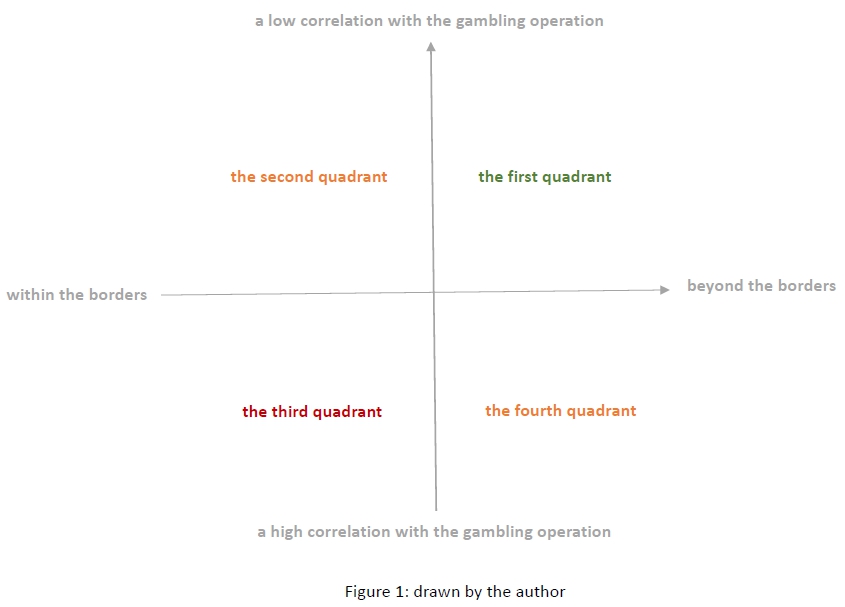依據歐盟施行的個人資料保護法,我們致力於保護您的個人資料並提供您對個人資料的掌握。
按一下「全部接受」,代表您允許我們置放 Cookie 來提升您在本網站上的使用體驗、協助我們分析網站效能和使用狀況,以及讓我們投放相關聯的行銷內容。您可以在下方管理 Cookie 設定。 按一下「確認」即代表您同意採用目前的設定。
Latest News
中銀文摘
2021-09-27
博弈產業法律專區
Legal boundaries in Taiwan and the Online Gambling Sub-Sector
【Charlotte S. H. Wu, Partner, Zhong Yin Law Firm】
charlotte.wu@zhongyinlawyer.com.tw
charlotte.wu@zhongyinlawyer.com.tw
Legal boundaries in Taiwan and the Online Gambling Sub-Sector
Novel business models introduced by business operators often conflict with the perpetuating legal framework. Thus, it is quite common for startup companies to promote the innovation of the legal system with the aim of striking a balance between the legal system and the social pulse. Typically, gambling industries and software manufacturing-service industries are not considered to be particularly innovative nor revolutionary. However, the dynamic relationship between the two may cause companies engaging in the simple provision of software developing and services to unwittingly verge on the illegal, or to be punished by the law. This is the exact dilemma faced by the online gambling sub-sectors.
Online gambling website operator subdivides its services into functional partitions, and outsources them to independent companies that are solely responsible for different services. These outsourcing services may be customer service, software design, accounting settlement system, and website design, etc. Those who provide respective services to online gambling website operators are the exact parties referred to as the ”online gambling sub-sector” in this artilce. These sub-sectors’ main businesses may be software service providers or professional customer service providers, which are generally considered to be beyond controversy under the current legal framework. Yet, once they undertake a customer operating an online gambling business, they run the risk of becoming dragged into criminal prosecution pursuant to existing regulations and judicial practices, such as violation of the gambling provisions of Articles 266 and 268 of the Criminal Code and other legal issues in Taiwan. Some of the main issues will be discussed below:
1. Jurisdiction
One of the most common defenses adopted by the online gambling sub-sector is that the website operates through overseas servers and also blocks the entry of gamblers from Taiwan. The overall operation has nothing to do with Taiwan. Thus Taiwan laws shall not apply and Taiwan authorities or court has no jurisdictions. However, such defense may not be acceptable to judicial authorities in accordance to Taiwan’s existing regulations.
In accordance with Article 4 of the Criminal Code of the Republic of China: “Where either the conduct or the result of an offence takes place within the territory of the Republic of China, the offence shall be considered as being committed within the territory of the Republic of China.” Article 2 of the Act Governing Relations between the People of the Taiwan Area and the Mainland Area defines the “Mainland Area” as the territory of the Republic of China precluding the Taiwan Area (i.e. the PRC). Article 75 of the Act Governing Relations between the People of the Taiwan Area and the Mainland Area stipulate as that, “Crimes committed in the Mainland Region or on the mainland’s ships and aircraft, although having been punished in the Mainland Region, may still be punished in accordance to the law. While the execution of punishment may be entirely or partly remitted.”
Based on regulations mentioned above, as long as either the locus of behavior or the locus of result is within the territory of the ROC, it is a crime committed within our country. Therefore, once the design, establishment or maintenance of the gambling platform is within the territory of Taiwan (locus of behavior), or the gambler comes from Mainland China (locus of result), both of these are exact cases that fall within the scope of ROC’s criminal jurisdiction and the perpetrators will be indicted for criminal charges. This perspective is also adopted by Taiwan’s current judicial practices.
2. The legal risk analysis associated with the crime of gambling provided for in Articles 266 and 268 in the Criminal Code and Article 84 of the Social Order Maintenance Law
Pursuant to the Criminal Code, the term gambling is defined as using accidental probability to compete with each other to determine the gain or loss of property. Gain or loss of certain property which cling on to accidental facts that cannot be foreseen in advance is considered to be gambling.
Second, in accordance with Article 266 of the Criminal Code: “A person who gambles in a public place or a place open to the public shall be punished with a fine of no more than thirty thousand New Taiwan Dollars unless the item for which he gambles is one to provide temporary amusement. Gambling apparatus at the site or a thing of value found at the gambling table or place for exchange of gambling tokens shall be confiscated whether or not it belongs to the offender.” Fines are the only criminal sanctions that are imposed by this statue. As for gambling places, based on the current court opinion, these locations are no longer limited to physically tangible spaces. As long as an unspecified number of people can participate in the gambling, places that exist in the online virtual world will not preclude satisfaction of the elements that constitute the crime of gambling. While it should be noted that, if private credentials, such as account numbers and passwords are being requested while gaining access to the online virtual gambling places, such factual context may trigger the liability imposed by Article 84 of the Social Order Maintenance Law, instead of crimes stipulated by the Criminal Code.
The main legal risk faced by online gambling operators is conviction under Article 268 of the Criminal Code. The code stipulates that a person who for the purpose of gain furnishes a place to gamble or assembles persons to gamble shall be punished with imprisonment for not more than three years; in addition thereto, a fine of no more than ninety thousand New Taiwan Dollars may be imposed. For a crime to occur, both subjective and objective legal elements must be present –whether the perpetrator has the subjective purpose of making profit, and whether the behavior objectively constitutes the provision of a gambling place.
As to the subjective element, the main current judicial opinion tends to agree that as long as the perpetrator has a reason to know that his/her behavior is to provide the operation of online gambling websites or software, then the intention of making a profit is also deemed to exist. There are only a few judicial opinions which adopt the perspective that it is still necessary to distinguish whether the source of profits is derived from gambling directly.
As to the objective element, based on the author’s overview of current judicial opinions, “operating online gambling websites”, “providing online gambling websites or games with customer services”, “providing online gambling websites with software/hardware maintenance”, “designing online gambling websites” are all types of conduct which may lead to conviction. Furthermore, whether the perpetrator plays an indispensable role in the overall business operation is the main standard to determine if the culpability is that of a principal offender or an accomplice.
As stated above, with the collation of judicial opinions, the author believes that the fulfillment of the objective element shall be determined by two factors: one is the proximity of the locus of behavior to that of the jurisdiction under the Taiwan Criminal Code. The other is the correlation between the perpetrator’s behavior and the operation of gambling businesses. The lower the correlation between the perpetrator’s behavior and the two factors mentioned above, the lower the risk of being convicted of this offence. These two dimensions of thought should be taken into consideration at the same time. As shown in the figure below, the first quadrant shows that due to the low correlation between the perpetrator’s behavior and the gambling operation, as the locus of behavior is beyond the borders of Taiwan, the legal risk is low ; the second quadrant indicates that the factor of the locus of behavior being within the borders of Taiwan heightens the risk of being accused of perpetuating a crime. Incidents which comply with the conditions of the third and fourth quadrants are in much higher risk of being accused of perpetuating a crime, due to the direct involvement in the operation of online gambling. The thinking paradigm constructed above will help business operators in making assessments of relevant legal risks by reconsidering the role of its behavior featured in the gambling operation.

3. Other legal risks
Another legal risk faced by the online gambling sub-sector is Article 153 which is the crime of inciting people to commit crimes. Judgments by the court interpret that the establishment of online gambling websites is to incite others to commit crimes prohibited by Article 266 of the Criminal Code. For example, if services provided by the online gambling sub-sector aim to help online gambling operators proceed with money laundering, this sort of conduct may still result in violation of the Money Laundering Control Act. Also, the size of the organization may cause the sub-sector to get trapped in crimes defined under the Organized Crime Prevention Act. These legal risks should not be overlooked.
To sum up, the online gambling sub-sector may be a software service operator or operators that simply provide customary services. Yet, if one of its clients operates an online gambling business, it may be at risk of being convicted of the offence of gambling once other elements have been fulfilled.
There have been media reports claiming that the current population of this sort of industry in Taiwan is at least three hundred thousand. Under the circumstances of a conservative social atmosphere and the absence of exemption from the special law, the online gambling sub-sectors still expose themselves to the risk of verging on the illicit. Current legal interpretations veer towards being suspected of suppressing innovative development of Taiwan’s software and other professional services, which may fail to meet the requirement of restraining criminal law principles. Therefore, the author hopes that the issue presented in this article can bring about introspection on the social meaning of gambling, the construction of legal possibilities under the criminal policy, and the reconciliation of the diverse interests among industrial development and legal institutions.

如您對上述的內容有任何意見或有興趣進一步瞭解,歡迎您聯繫我們。
Charlotte J.H. Wu 吳婕華律師
charlotte.wu@zhongyinlawyer.com.tw
TEL +886 2 2377 1858 EXT 8888




